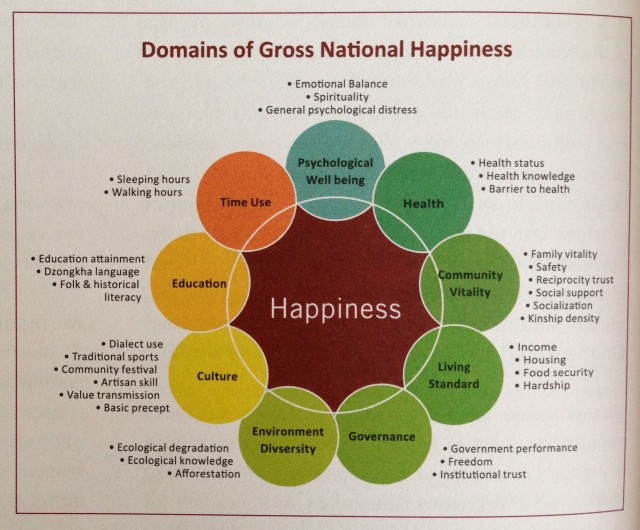I wrote this article for Stadsleven (“City Life”), an Amsterdam-based talk show about urban issues. The next session on 27 January will be dedicated to the Happy City, and the editor of Stadsleven asked me to explain what our cities can learn from Gross National Happiness (GNH) in Bhutan. The original Dutch version can be found here.
What is the objective of the state? Philosophers and leaders have been reflecting about this question for thousands of years. Most states focus their policies on economic development. The assumption is that when a country becomes richer, its citizens will be better off. But is that the case? Research shows that the Western world is a lot richer than fifty years ago. At the same time, we are hardly any happier than in the 1950s.
For Bhutan, a small Buddhist kingdom in the Himalayas, these conclusions do not come as a surprise. Already in 1972, Bhutan based its policy on Gross National Happiness (GNH). GNH takes a broader approach than economic interests, and also helps the state to consider the influence of factors like health, mental well-being and community life. Bhutan’s king observed that these factors largely influence the happiness and quality of life of the Bhutanese, and thus put them as the central objective of public policy. The video explains how it works:
Bhutan’s core philosophy thus is different, and we hardly realise how revolutionary that is. The economy and Gross Domestic Product (GDP) are central topics in the public debate in the Netherlands. We’re confronted with growth forecasts on a daily basis. Many people in the Netherlands will know that the target for the budget deficit is 3%. But will they have an idea about national happiness level? Probably not. And consider that the Social and Cultural Planning Agency (SCP) recently concluded that quality of life decreased between 2010 and 2012, for the first time in thirty years!
After Bhutan, the UK, the OECD and the European Commission, to name some, GNH could also inspire the Netherlands (and Amsterdam). Of course there is no way that our political leaders should tell you and me how to be happy. Dutch Prime Minister Mark Rutte is right in saying that the state is not a happiness machine. But the government does have the responsibility for our quality of life. But how, and what does make us happy?
The British new economics foundation has researched five ways to well-being. These are factors that affect the happiness and well-being of an individual: connect, be active, take notice, keep learning and give. Cities can integrate some elements in their urban planning and design. Public spaces can be designed to facilitate that people meet each other (connect) or are invited to do sports (be active). Through education and community activities, city councils can promote skills and values that help us to appreciate the moment (take notice), be curious (keep learning) and share with others (give).
The lessons of Bhutan deserve to be followed. Isn’t there a more noble cause than a happy city?



